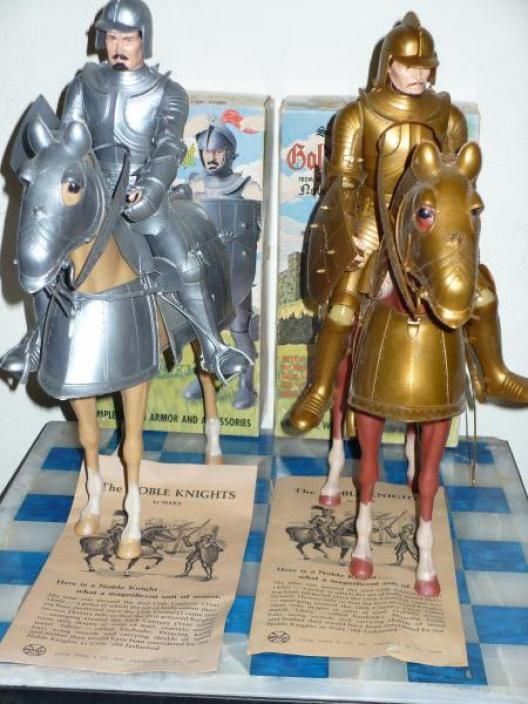The late, great Marx Toys — Part 1
Marx Toys was arguably the greatest toy company of mid-century America. It created the coolest toys ever — our house was full of Marx Toys. They are remembered for inventing Rock’em Sock’em Robots (introduced in 1964) and its best-selling sporty Big Wheel tricycle, one of the most popular toys of the 1970s. In fact, the Big Wheel, which was introduced in 1969, is enshrined in the National Toy Hall of Fame.
One of our favorite Marx toys were the Marx “Noble Knights” — my younger brother had Sir Gordon the Gold Knight and I had Sir Stewart the Silver Knight (with their respective horses, Bravo and Valour). Sir Gordon and Sir Stewart waged an epic battle across the floor of the main room in our basement from behind complex cardboard fortifications and reinforced with an army of obedient and self-sacrificing G.I. Joes. It was a battle from which no one emerged triumphant … although I still have my Sir Stewart while Sir Gordon has long been lost to the dustbin of history, so I’m declaring unilateral victory at this point by rights of being last knight standing.

Marx is also a cautionary tale on the importance of investing in advertising. According to Wikipedia:
In 1955, with sales of $50 million, Marx spent a mere $312.00 on advertising for the entire year (Time Magazine, 1955). By contrast, Mattel Toys in the same year had sales of $6 million but spent $500,000 for advertising, sponsoring shows like The Mickey Mouse Club (Clark 2007, p. 220)
There is a great case study in the classic film “What is a Brand?” which is a discussion between Stephen King and Jeremy Bullmore at J. Walter Thompson in 1974. At 18:00 they show how varying levels of advertising investment by Andrex and Delsey (toilet paper brands in the UK market) eventually led to dominance by Andrex as they built emotional preference for their brand and were able to sell at less of a cut price. We too often look at advertising as a cost instead of an investment because it is difficult to immediately quantify the outcome. However, history is clear on the issue — Early to Bed; Early to Rise; Work like Hell; and Advertise.
Next: The Late, Great Marx Toys, Part 2
#MarxToys #Marx #NobleKnights #BigWheel #RockEmSockEmRobots #JWT #WhatIsABrand #Advertising
